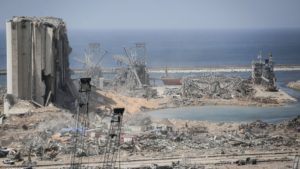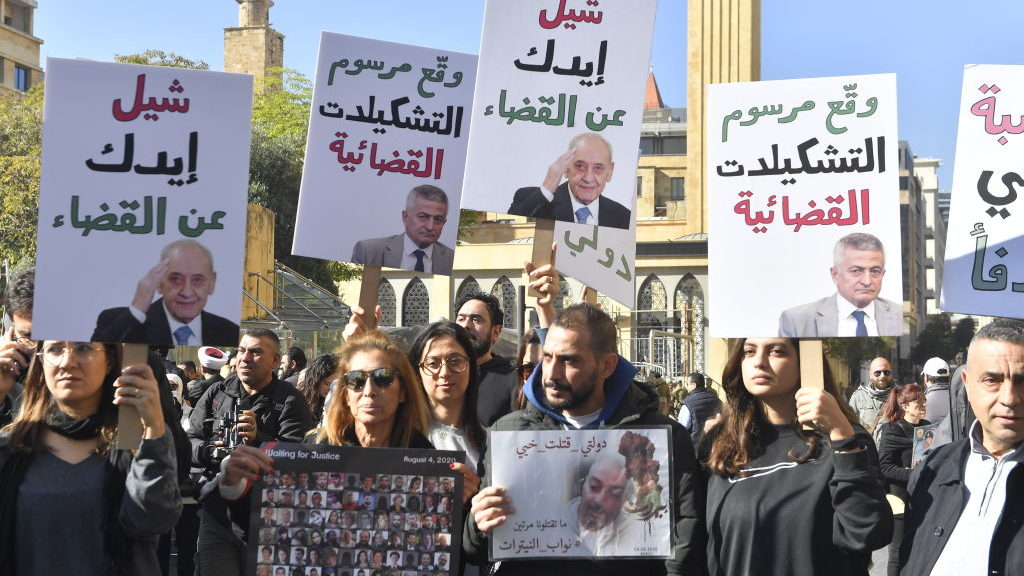Families of Beirut Port Blast Victims Face Prosecution
More than two years after the tragedy that killed 220 people, the investigation remains stalled and some of the victims’ relatives have been detained during protests calling for accountability
[Beirut] Justice has failed William Noun twice.
The first time was on August 4th, 2020. When a fire broke out in Lebanon’s Port of Beirut, his brother Joe was part of the emergency team that answered the initial call to put it out. Those nine firefighters and one paramedic were the first to die after the 2,750 tons of ammonium nitrate stored in a hangar at the port exploded. The second time was last week, when he was detained. Noun was taking part in a protest with the relatives of other victims, who have been asking for justice for more than 2.5 years, even as the investigation of this tragedy has been stalled for over a year.
Noun was summoned to court with 11 other relatives of port blast victims to answer to charges of rioting, vandalism and damaging government offices following a violent protest inside the Justice Ministry in Beirut. A couple days later, Noun and Peter Bou Saab, the brother of another firefighter on Joe’s team who also was killed, were released. Their freedom came after hours of pressure from popular opinion. Many asked themselves how the siblings of victims could be arrested when none of those responsible for the explosion at the port have been held accountable.
“The proceedings have been totally sabotaged and they are suspended,” lamented Zena Wakim, a Lebanese national qualified as a Swiss attorney who is an international lawyer for Accountability Now. She is part of a group of attorneys that created the Swiss foundation to find ways to circumvent the judiciary in Lebanon and get justice for the Beirut port victims. “We started to tackle the corruption from politicians and their illicit enrichment but the blast case is a financial crime that leads to a catastrophe which originates in corruption,” she told The Media Line.

Beirut Port in the aftermath of the explosion, Aug. 9, 2020. (Mahdi Shojaeian/Wikimedia Commons)
Right after the blast devastated half of Beirut, killed over 220 people, injured around 6,500 and destroyed or damaged 300,000 houses, Lebanese authorities promised that the investigation results would be published “in five days.” Almost 900 days have passed and there have been no conclusions. Two judges have been appointed to investigate the explosion. Judge Fadi Sawan charged Lebanon’s former caretaker Prime Minister Hassan Diab and three former government ministers with criminal negligence. A complaint against the judge was filed, and Sawan was replaced by Judge Tarek Bitar at the end of 2020.
Bitar represented the hope and even the bravery of the judiciary. At one point, some people thought that this case would put an end to impunity for the political class. He charged top security officials, including two members of parliament, for involvement in the explosion. There were some detentions, but none of those detained were significantly responsible for the network of mismanagement and corruption that led to the tragedy.
Sawan and Bitar tried to lift parliamentary immunity in order to legally prosecute former and sitting members of parliament. But the system has proven to be too strong.
This holiday season, give to:
Truth and understanding
The Media Line's intrepid correspondents are in Israel, Gaza, Lebanon, Syria and Pakistan providing first-person reporting.
They all said they cover it.
We see it.
We report with just one agenda: the truth.


The accused politicians have continually attempted to remove the judge by filing legal complaints, which have temporarily suspended the investigation for more than a year.
Paul Naggear’s three-year-old daughter Alexandra was killed on that fateful August afternoon. “The criminal regime that is in place has done a very good job at taming the investigation,” he told The Media Line.
Meanwhile, the lack of a quorum in the Plenary Assembly of the Court of Cassation means that rulings on the complaints against Bitar cannot be issued until separate complaints against the judges assigned to the cases are settled.
“The political class has been pretty successful in their attempt to remove it from the public and the media attention,” Naggear said of the investigation. “We, as families of the victims, try to share as much communication about it as possible with our sit-ins at the port and the protests.”
While the whole of Lebanese society struggles to make ends meet, these relatives are not giving up on their fight for justice.
“After all this time there is still nothing; no truth, no justice,” Naggear told The Media Line. “Justice and accountability would bring some peace of mind to my family which is so much needed.”
“We are not asking much, this is something normal that any citizen from any other country would ask for,” he added.
“This case is not something legal, it is political; so, the investigation will only be resumed when there is some political will since it’s not a lack of evidence that is stopping the procedure, it’s the lack of political will,” Wakim explained.
Two years and a half after the blast, no one has been condemned for it. A Human Rights Watch report from 2021 stated that senior Lebanese officials have been directly implicated in the explosion but the “systemic problems in Lebanon’s legal and political system are allowing them to avoid accountability.”
Now, the victims’ families are suffering not only injustice, but also prosecution. Despite the aggressive response from the authorities, they do not give up.
“We will never stop,” said Naggear. “As many walls as we have, we will keep fighting for alternative routes and we will keep pushing.” Alexandra’s dad concluded: “Truth, justice and accountability. That’s all we are asking for.

